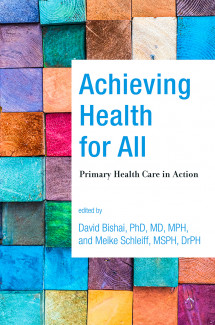
Johns Hopkins UniversityEst. 1876
America’s First Research University
Now Browsing:
Achieving Health for All: Primary Health Care in Action

What makes a person healthy? Before 2020, most people in high-income countries would have said: good personal choices and good health insurance. After 2020, people everywhere—rich and poor alike—realize that their own good choices were not enough. Now, the answer to being healthy obviously includes the public health choices of everyone in the places that we live.
In the new book, Achieving Health for All, which we edited for the JHU Press, we emphasize that this 2020 global epiphany is actually déjà vu. In 1978, the public health choices in communities became the central concern of a global UN conference held in Alma-Ata, Kazakhstan. Delegates rallied around the term “comprehensive Primary Health Care” which was described further in the Declaration of Alma-Ata as, “essential care based on practical, scientifically sound and socially acceptable methods and technology made universally accessible to individuals and families in the community through their full participation and at a cost that the community and country can afford to maintain at every stage of their development in the spirit of self-reliance and self-determination.”1
The Declaration included the goal of “health for all by the year 2000” centering on the need for increased attention to community engagement and the need for collaboration and coordination among countries and other stakeholders in multi-sectoral action. There is a common myth that the Alma-Ata vision never took off because it would be too ideological or costly to get people to work together to make communities healthy. As time wore on, this myth got to be so powerful in rich countries that Alma-Ata words, “comprehensive Primary Health Care”, lost their old meaning and started to be used to refer to just clinical health care. Until the last few months, people who should have known better would give talks about “health” policy and speak exclusively about giving people health care and health insurance. Nobody would do that now. It is pretty obvious that health insurance and health care are important, but not enough to keep people healthy. These are just pieces of a more comprehensive approach to making a whole place healthy and resilient against pandemics and all the other 21st-century health threats that might come next.

Now, everybody knows what was once forgotten: being healthy depends on the collective responses of a community. COVID-19 makes it obvious that comprehensive strategies like Primary Health Care (PHC) that were put into action to make whole places healthy were always the right strategy. This makes a book on how countries can get PHC done especially timely. This book pulls together country experiences documenting how the vision and principles of PHC were applied over the past 40 years in diverse contexts. Our seven country case experiences, including Nepal, Vietnam, Ethiopia, Sri Lanka, Cuba, Ghana, and Bangladesh, show how comprehensive PHC has been instrumental in the successful delivery of health interventions as well as achieving a system that reacts to and responds to emerging health challenges like COVID-19.
Achieving Health for All is an engaging and pragmatic view of what a PHC approach can achieve and a hope-inducing nudge to restore community-based systems for improving health. This includes community-inclusive planning, bringing sectors like education, commerce, and agriculture into health policy, and maintaining a workforce equipped for community outreach. This book can serve as a textbook in courses on global health and it can also guide policymakers and program implementers and national and sub-national leaders to build on the depth and diversity of experiences that have amassed in recent decades.
Luckily, PHC is on the radar of many countries, donors, and other stakeholders as a key enabler and condition of being able to achieve not only the health-related Sustainable Development Goal (SDG) 3, but as an essential foundation to meeting all 17 SDGs.
The myths that comprehensive primary health care is unrealistic and the corollary that the focus of health policy should be to hand out good health insurance plans are ideas that deserve their rightful place in the dustbin as we move forward out of 2020. The truth is that comprehensive PHC is a road well-traveled, but less celebrated. Because everyone can—and we argue must—have a role to play in realizing their community’s version of PHC, this new book invites each reader to identify what their role will be!
Order Achieving Health for All: Primary Health Care in Action – published on September 15, 2020 – at the following link: https://jhupbooks.press.jhu.edu/title/achieving-health-all
David Bishai, MD, MPH is a professor at the Johns Hopkins Bloomberg School of Public Health. Meike Schleiff, MSPH, DrPH is an assistant scientist at the Johns Hopkins Bloomberg School of Public Health. Together, they are the editors of Achieving Health for All: Primary Health Care in Action.

In the new book, Achieving Health for All, which we edited for the JHU Press, we emphasize that this 2020 global epiphany is actually déjà vu. In 1978, the public health choices in communities became the central concern of a global UN conference held in Alma-Ata, Kazakhstan. Delegates rallied around the term “comprehensive Primary Health Care” which was described further in the Declaration of Alma-Ata as, “essential care based on practical, scientifically sound and socially acceptable methods and technology made universally accessible to individuals and families in the community through their full participation and at a cost that the community and country can afford to maintain at every stage of their development in the spirit of self-reliance and self-determination.”1
The Declaration included the goal of “health for all by the year 2000” centering on the need for increased attention to community engagement and the need for collaboration and coordination among countries and other stakeholders in multi-sectoral action. There is a common myth that the Alma-Ata vision never took off because it would be too ideological or costly to get people to work together to make communities healthy. As time wore on, this myth got to be so powerful in rich countries that Alma-Ata words, “comprehensive Primary Health Care”, lost their old meaning and started to be used to refer to just clinical health care. Until the last few months, people who should have known better would give talks about “health” policy and speak exclusively about giving people health care and health insurance. Nobody would do that now. It is pretty obvious that health insurance and health care are important, but not enough to keep people healthy. These are just pieces of a more comprehensive approach to making a whole place healthy and resilient against pandemics and all the other 21st-century health threats that might come next.

Now, everybody knows what was once forgotten: being healthy depends on the collective responses of a community. COVID-19 makes it obvious that comprehensive strategies like Primary Health Care (PHC) that were put into action to make whole places healthy were always the right strategy. This makes a book on how countries can get PHC done especially timely. This book pulls together country experiences documenting how the vision and principles of PHC were applied over the past 40 years in diverse contexts. Our seven country case experiences, including Nepal, Vietnam, Ethiopia, Sri Lanka, Cuba, Ghana, and Bangladesh, show how comprehensive PHC has been instrumental in the successful delivery of health interventions as well as achieving a system that reacts to and responds to emerging health challenges like COVID-19.
Achieving Health for All is an engaging and pragmatic view of what a PHC approach can achieve and a hope-inducing nudge to restore community-based systems for improving health. This includes community-inclusive planning, bringing sectors like education, commerce, and agriculture into health policy, and maintaining a workforce equipped for community outreach. This book can serve as a textbook in courses on global health and it can also guide policymakers and program implementers and national and sub-national leaders to build on the depth and diversity of experiences that have amassed in recent decades.
Luckily, PHC is on the radar of many countries, donors, and other stakeholders as a key enabler and condition of being able to achieve not only the health-related Sustainable Development Goal (SDG) 3, but as an essential foundation to meeting all 17 SDGs.
The myths that comprehensive primary health care is unrealistic and the corollary that the focus of health policy should be to hand out good health insurance plans are ideas that deserve their rightful place in the dustbin as we move forward out of 2020. The truth is that comprehensive PHC is a road well-traveled, but less celebrated. Because everyone can—and we argue must—have a role to play in realizing their community’s version of PHC, this new book invites each reader to identify what their role will be!
Order Achieving Health for All: Primary Health Care in Action – published on September 15, 2020 – at the following link: https://jhupbooks.press.jhu.edu/title/achieving-health-all
David Bishai, MD, MPH is a professor at the Johns Hopkins Bloomberg School of Public Health. Meike Schleiff, MSPH, DrPH is an assistant scientist at the Johns Hopkins Bloomberg School of Public Health. Together, they are the editors of Achieving Health for All: Primary Health Care in Action.

[1] WHO. 1978. Declaration of Alma-Ata. Alma-Ata, Kazakhstan. https://www.who.int/publications/almaata_declaration_en.pdf.
Login to View & Leave Comments
Login to View & Leave Comments


